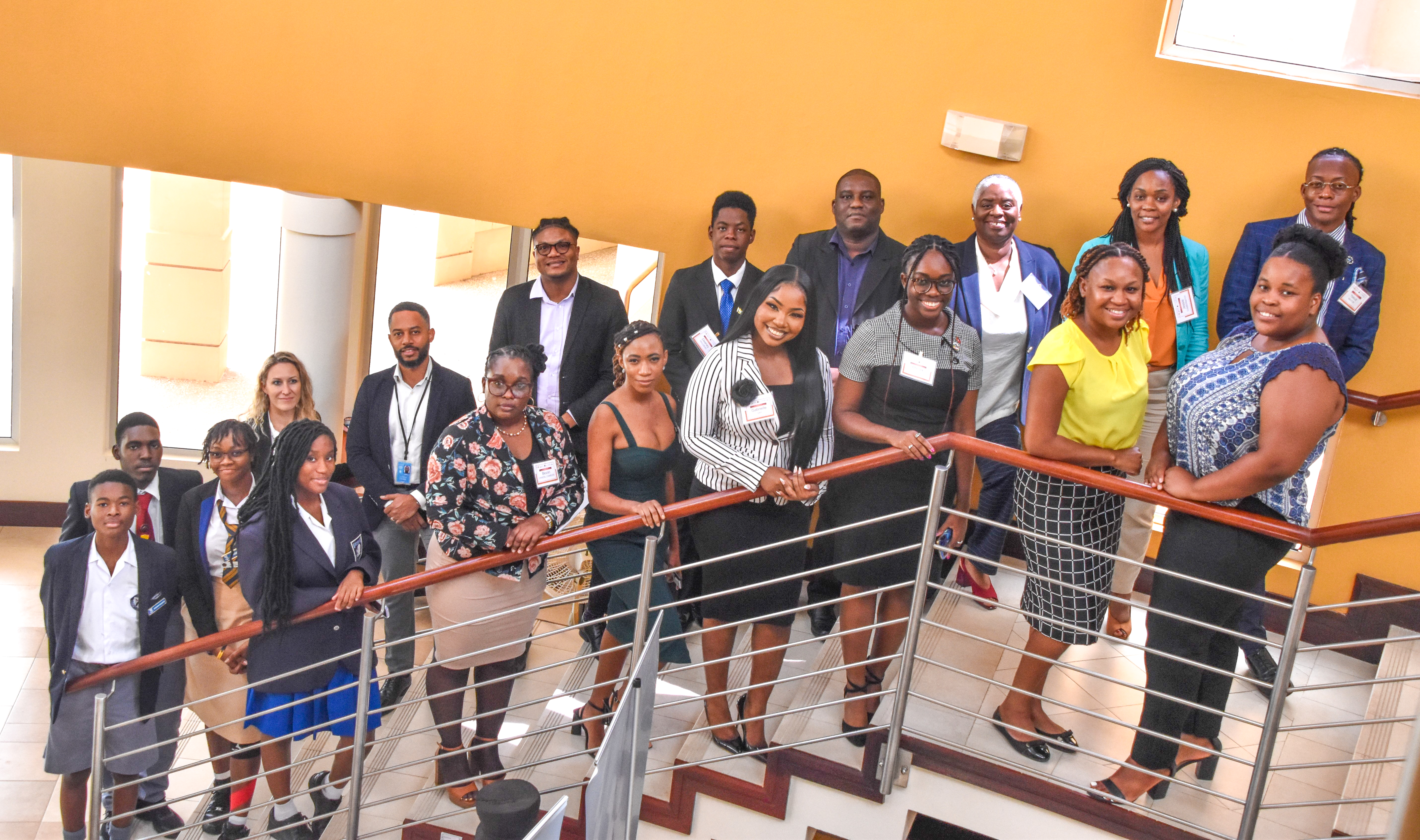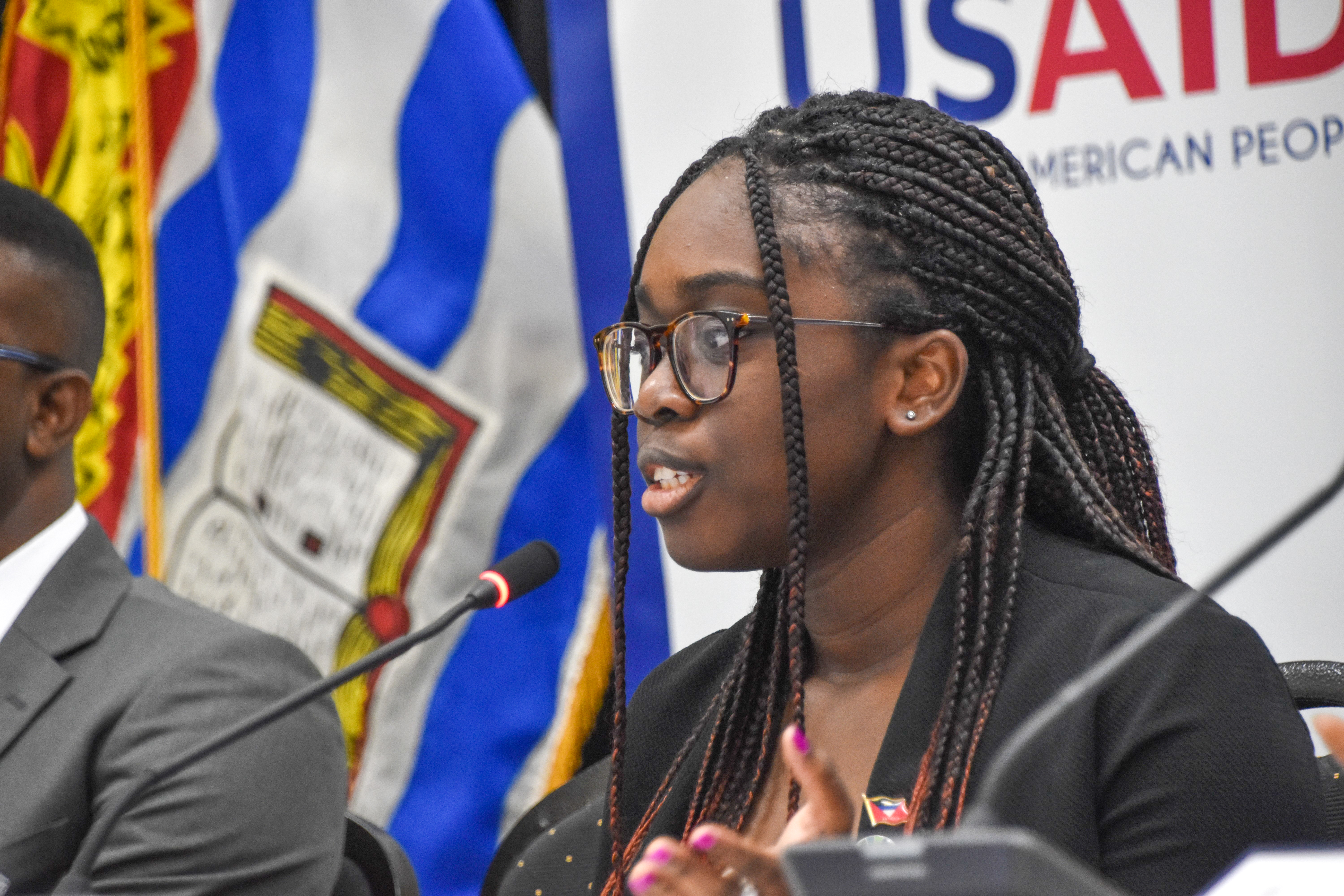Youth Representatives Weigh in on Caribbean Citizen Security at CariSECURE 2.0 Crime Symposium
June 28, 2023

Youth representatives took centre stage at a recently-held crime symposium, hosted by CariSECURE 2.0, the Office of the Principal at the University of the West Indies (UWI) Cave Hill Campus and the UWI Centre for Criminal Justice and Security (CCJS), where they advocated for restructured educational approaches, peer mentorship, and technological solutions to combat issues of citizen security in the Caribbean.
CariSECURE (Strengthening Evidence Based Decision Making for Citizen Security in the Caribbean) 2.0 is a component of United States Agency for International Development’s (USAID) Youth Empowerment Services (YES) project and is made possible with the support of USAID and the technical assistance of the United Nations Development Programme (UNDP).
The symposium was made up of several panels, each examining available research on targeted social approaches to crime prevention particularly among youth.
Speaking on “Information and Communications Technology (ICT) and the road to Data Informed Decision-Making”, USAID/ESC Youth Council members Yakub Nestor and Rhoda Essien showed support for the CariSECURE developed Police Records Management Information System (PRMIS), which provides digital mechanisms for data capture, analysis and sharing, allowing for better targeted interventions by those working within regional citizen security networks.
While imploring greater participation of women in STEM, Ms Essien also made the case for greater youth involvement in the development of digital solutions to crime.
“Young people love technology, and we are little detectives, especially as it relates to crime. So police can have all this data but they [also need to] look at trends among youth. For example, in crime solving, I wouldn’t want to call [the police], I might feel intimidated so would rather text. If we can connect these programmes to web applications, where young persons have access, they can input information.
“[Youth] have some very brilliant ideas, so why don’t we bring this idea up to them, and have them actually build it out too, because they are smart, intelligent, and they have the capability to do so. Technology is something which changes every day and young people are seeing things from a different perspective. So how do we implement their ideas?”
UN Youth Advisory Group representative Gabrielle Gay spoke on a separate panel on “Modern Responses and Changes in Criminality within the Criminal Justice System”, where she agreed that introducing new educational options could eventually aid in the enhancement of regional crime prevention, especially through the use of AI in alternate dispute resolution.
Speaking passionately, she told attendees “We need individuals from Caribbean backgrounds to be a part of producing these technologies… We are churning out lawyers who are specialized in everything except for the technological revolution that is happening right now… So we must return to legal technology subjects on the curriculum. It’s not a choice; it’s a matter of survival.
“I advocate for education because it is the nucleus of progress. If we educate individuals, this is how we change perspectives and policy – when people fully understand the issues and how to circumvent them.”
Her UN Youth Advisory Group counterpart Taahir Bulbulia also weighed in, stressing that current educational systems are restrictive for those with non-traditional academic interests, and encouraged the formation of support systems to respond to those who leave the school system without clear routes to progress.
For Bevon Charles, a USAID/ESC Youth Council member who sat on a panel for “Social Mapping of Youth Involved with Crime and Violence”, entrepreneurship and empowering youth-led NGOs seem to be an answer for youth lacking positive guidance.
“There’s a sense of hopelessness in our communities,” she shared. “Youth have passion, drive and innovative ideas but what they lack is the space to develop and share their own stories among their peers, where they can come together and foster that development. By roping in your peers, you have a bigger voice to amplify across the region, in order to give that necessary impact that we need for sustainable growth.”
Support for peer collaboration and mentorship was echoed by Tyrell Giles, project manager of Barbados’ National Peace Programme, as well as Renee Holford and Omari Cheltenham of the Barbados Student Council (BSC).

Mr Cheltenham, Vice President of the BSC, pointed out the critical role of positive spaces for those predisposed to deviant behavior.
“As a youth, I can listen to an adult,” he explained, “But imagine someone my age telling me I’m doing something wrong; I will listen to him more because that’s my friend. Peer counselling is important and [so is] investment in resource centres in communities. Youth can go to this safe zone so they can recuperate and get back into their right state of mind. Being helped at home, school and the community means when youth grow up they can communicate, speak about emotions, develop well and stay away from violence because they know my community is watching me, my teachers are watching me and so are my parents.”
Youth representatives also stressed the need for meaningful youth involvement throughout all stages of the programming process.
Ronelle King, UN Youth Advisory Group representative, pointed out “meaningful youth engagement means engaging youth at all stages, the consultation, development and implementation and the evaluation stage. But we also need to go further back and look at our approach to policy. When looking at youth in crime and violence we see them as problems to be solved, rather than young people who are struggling with complex issues and obstacles. They have realities that they are struggling to deal with and are trying to find outlets in which to navigate life.
“Once policy is drafted and implemented, youth are often seen as a monolith and not recognized as having unique and diverse identities. We have to include youth with disabilities, LGBT youth, youth from all walks of life, otherwise it is not going to be a holistic document… The approach has to be intersectional, and we must include a gender lens so when we look at crime and violence we don’t perpetuate it the same way.”
The crime symposium, held 25-26 May at the Sagicor Cave Hill School of Business and Management reflects an integral part of CariSECURE 2.0’s objective to strengthen evidence-based decision making among agencies responsible for reducing and responding to youth crime in the Eastern and Southern Caribbean.

 Locations
Locations



